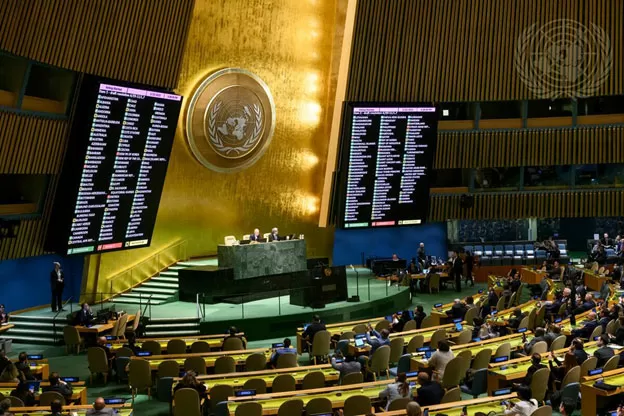Last week, the United Nations (UN) celebrated its 80th anniversary amidst one of the greatest global crises in history. The world is grappling with a deadly pandemic, economic downturns, and increasing social and political tensions. Against this backdrop, the UN’s mission to promote international cooperation and maintain peace and security may seem more challenging than ever. However, as we reflect on the UN’s achievements and its founding values, we are reminded that the organization’s vision remains as relevant and crucial as it was 80 years ago.
The UN was established in 1945 in the aftermath of World War II, with the primary aim of preventing another catastrophic global conflict. Its founding charter affirmed the principle of “We the Peoples,” highlighting the importance of collective action and inclusivity in tackling global challenges. Today, the UN has 193 member states, making it the most inclusive and representative international forum in the world.
One of the UN’s most significant achievements is the creation of a rules-based international system that promotes cooperation and dialogue among nations. This system has played a crucial role in preventing the outbreak of a third world war and has helped resolve many conflicts through peaceful negotiations. Despite the current rise in international tensions and conflicts, the UN has successfully brokered peace agreements in various regions, including Sudan, Timor-Leste, and Colombia. These efforts have saved countless lives and prevented further displacement and suffering.
Moreover, the UN’s commitment to promoting and protecting human rights has been at the core of its work since its inception. The Universal Declaration of Human Rights, adopted by the UN General Assembly in 1948, remains a fundamental document in the fight for human rights globally. The UN has also played a pivotal role in advocating for and implementing international conventions and treaties that protect vulnerable groups, such as children, women, refugees, and indigenous peoples. Through its human rights mechanisms, the UN has raised awareness and held governments accountable for their actions, paving the way for more just and inclusive societies.
Another significant contribution of the UN is its efforts in promoting international development and addressing global challenges. Through its specialized agencies, such as the World Health Organization, the United Nations Development Program, and the Food and Agriculture Organization, the UN has worked towards eradicating poverty, hunger, and disease. Its Sustainable Development Goals (SDGs), adopted in 2015, serve as a blueprint for a more sustainable and equitable world. Despite obstacles and setbacks, the UN has made significant progress towards achieving these goals, lifting millions of people out of poverty and promoting sustainable development in many countries.
However, as the UN celebrates its 80th anniversary, it also faces its share of challenges. The rise of nationalism and populism in many parts of the world has led to a decline in trust in multilateralism and international cooperation. This skepticism towards the UN and other international institutions has been exacerbated by the increasing number of conflicts and crises, including the ongoing COVID-19 pandemic. Many people feel disillusioned with the UN’s ability to address these complex and urgent issues effectively.
Nevertheless, we must not lose sight of the UN’s enduring values and ideals. The world today is vastly different from the one in 1945, and the UN has evolved to meet new challenges and realities. The UN’s commitment to “We the Peoples” means that it must continue to adapt and innovate to remain relevant and effective in promoting peace, human rights, and development for all.
On its 80th anniversary, the UN is at a critical juncture. The world is facing unprecedented challenges, but the UN’s founding vision, rooted in inclusivity, cooperation, and equality, remains as vital as ever. As we look towards the future, it is imperative that we support and strengthen the UN, as the preeminent platform for global dialogue and action. The UN may not be perfect, but it is our best hope for a safer, fairer, and more sustainable world. Let us celebrate its achievements and recommit ourselves to the noble ideals that the UN represents. As the famous saying goes, “We may have come a long way, but we have not yet reached our destination.” Let us strive towards a better world together, guided by the spirit of “We the Peoples.”



